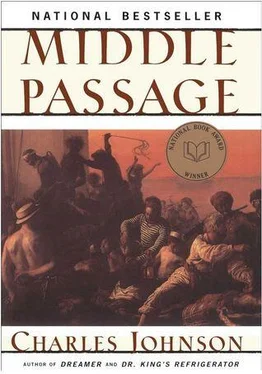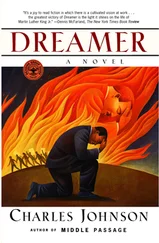Dependent as we were on each other, hardship brought out small kindnesses as well as cruelty, even from the most unlikely people, among them Nathaniel Meadows, a barber-surgeon who looked, for all the talk of his being an ax-murderer, Biblically meek: a crankled little stretchbelly with fishy eyes and big scarlet ears, who kept his hair slicked back with seal’s oil. He had no chin to speak of, his jaws dropping straight down into his neck. He smelled like the dogs on ship. He superstitiously carried a clump of Liverpool sod in his trousers when at sea, a habit shared by many old salts; but unlike anyone I have ever known he had the unsettling habit of blinking rapidly when he spoke. There was a space between his teeth, which gave his s ’s a faint whistling sound when he pronounced them, as if he’d swallowed a flute but got it only halfway down his trachea. Some deck hands said his mother had been frightened by a field mouse when she was carrying him. That wasn’t hard to believe. He looked like a titmouse in human form. And Meadows had no chest at all — that is, in profile his body curved like a question mark, and you’d associate his tamed, quiet manner with, say, reformed alcoholics, or men who’re recovering from a stroke. Meekness aside, I still gave him a wide berth. “ ’Ello, mate. ’Bout to do my laundry, I am,” says he to me. “Just wonderin’ if you need anythin’ washed, Mr. Calhoun.”
His arms loaded down with the wash of others, he approached me by the spanker-boom, where I was biting into the last of my breakfast, a biscuit going bad, on the verge of molding, you know, visibly all right on the outside but, once I sank my teeth in, it tasted as if it was loaded with dust. I tossed it to one of the children in a jolly boat, then put down my kid (eating tub), and stood to the sound of sudden growling behind Meadows’s legs. He’d brought one of the dogs with him, a half-starved mongrel who apparently wanted something dark to chew on. I drew back.
“ ’Ey, don’t mind him,” said Meadows. “ ’E’s just hungery.”
“I can tell.” His dog starting sniffling at my crotch, poking his nose between my legs, which convinced me it might be time to do my laundry after all.
“You want your shirt washed or wot?”
I slipped it off and placed it on top of his pile, noticing there one of Cringle’s blouses and the ragged cloths a few of the Allmuseri used to cover themselves. “Meadows,” says I through clogged sinuses, “you’re scrubbing clothes for the slaves too?”
“Aye, might’s well. If you’re goin’ to wash, ’tis better to do a full load, wouldn’t you say? Saves on soap ’n’ water.”
He was one to save on supplies, I remembered, being the sort of man who mashed together slivers of soap left by others to make a new, lopsided bar. Watching him leave, I scolded myself for distrusting him and wished the others might be as helpful as Meadows, especially when it came to lightening the suffering of the Africans. As I said, the ship made a great deal of water. Night and day, Falcon kept the pumps working. Even so, the slaves still lay in a foot of salt water in a hold blacker than the belly of Jonah’s whale, forced below by the boatswain’s cat-o’-nine-tails. Some rested on the laps of others, down there in scummy darkness foul with defecation, slithering with water snakes. Chumps of firewood were given to each for a pillow, which later proved to be a mistake. Up above, the skipper had us cut apertures and grate hatches and bulkheads to provide better air for the Allmuseri, who only came topside (the men) for a few hours each day to have their hair and nails shorn to prevent them from injuring themselves during the fighting for space that inevitably broke out each night. At nine o’clock sharp each morning, when the weather permitted, a mate named Fletcher trotted them out, made them dance a little to music from the cabin boy’s flute for exercise, then hurried them below again. It was Captain Falcon’s belief that slave insurrections could be prevented if for every ten prisoners one was selected to oversee the others and keep them in line. He issued these shipboard major-domos, one of them named Ngonyama, whom I came to know well those first few weeks, old shirts and tar-splattered trousers, giving them the advantage of being clothed like the crew; they had greater freedom to roam the slippery deck, and Falcon also gave them better food and a few minor tasks such as picking old ropes apart. “The best way to control a rebellious nigger,” said he, “is to give him some responsibility.”
However, few slaving formulas worked with Ngonyama. Dressed he was now, in tarry breeches and a duck frock, which distinguished him from the others, despite the red bead in his right nostril, and he was quiet during our first fortnight at sea, notwithstanding wind that whipped the sails devilishly and the fact that sometimes the sea ran as high as five houses and our forward deck was invisible underwater, a thing that made the other slaves claw and wail all the more. But Ngonyama, I had the feeling, was waiting. He was so quiet sometimes he seemed to blend, then disappear into the background of shipboard life. Quiet and cunning, I’d say, because he was studying everything — everything — we did, and even enlisted my aid in teaching him a smattering of English and explaining how the steerage worked, in exchange for his teaching me Allmuseri. Of all the players who promenade through this narrative, he was easily the most mysterious. At first he could not distinguish any of the white crew individually, and asked me, “How do their families tell them apart?” I suppose he selected me because I was the only Negro on board, though the distance between his people and black America was vast — his people saw whites as Raw Barbarians and me (being a colored mate) as a Cooked one. And his depth perception so differed from mine that when he looked at a portrait of Isadora I carried in my purse, he asked, “Why is her face splotched with smudges?” by which he meant the shadows the artist had drawn under her chin and eyes, for his tribe did not use our sense of perspective but rather the flat, depthless technique of Egyptian art. (He also asked why her nose looked like a conch, if maybe this was a trick of vision too, then saw my anger and dropped the question.)
Sometimes he helped Squibb and me in the cookroom, and the way he carved one of the skipper’s pigs stopped me cold. Me, I never could carve. But Ngonyama, his shoulders relaxed, holding his breath for what seemed hours before he started, fixed his eyes as if he could see through the pig, his right hand gripping the cook’s blade as if it had grown right out of his wrist. It was eerie, you ask me. It seemed, suddenly, as though the galley slipped in time and took on a transparent feel, as if everything round us were made of glass. Ngonyama began to carve. He slipped metal through meat as if it wasn’t there or, leastways, wasn’t solid, without striking bone, and in a pattern I couldn’t follow, without hacking or rending — doing no harm — the blade guided by, I think, a knack that favored the same touch I’d developed as a thief, which let me feel safe tumblers falling a fraction of a second before they dropped, tracing the invisible trellis of muscles, tendons, tissues, until the pig fell apart magically in his hands. He left no knife tracks. Not a trace. The cookroom was as quiet as a tomb when he finished.
“Mirrors!” Squibb whispered to me, stunned. “It’s some kinda heathen trick!”
Yet there was no trick to it. In every fiber of their lives you could sense this same quiet magic. Truth to tell, they were not even “Negroes.” They were Allmuseri. Talking late at night, blue rivulets scudding back and forth on the deck, our eyes screwed up against the weather, Ngonyama unfolded before me like a merchant’s cloth his tribe’s official history, the story of themselves they stuck by. Once they had been a seafaring people, years and years ago, and deposited their mariners in that portion of India later to be called Harappa, where they blended with its inhabitants, the Dravidians, in the days before the Aryans and their juggernauts—“city-destroyers”—leveled the civilization of Mohenjo-Daro overnight. Between 1000 B.C. and 500 B.C. they sailed to Central America on North Equatorial currents that made the voyage from the west coast of Africa to the Caribbean only thirty days, bringing their skills in agriculture and metallurgy to the Olmec who, to honor these African mariners, stamped their likeness in stone and enshrined in song their prowess as warriors. Specifically, their martial-art techniques resembled Brazilian capoeira. Over time these elegant moves, which Ngonyama taught me when we had time for rest, had become elements in their ceremonial dance.
Читать дальше












